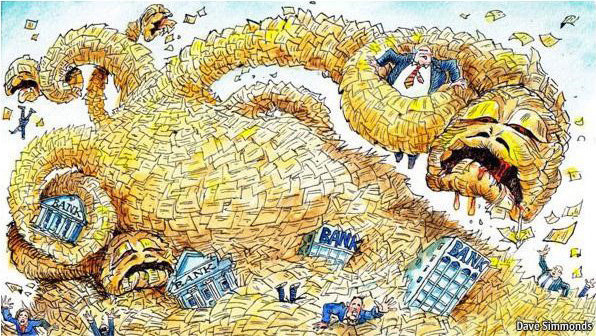Lehman collapsed in September 2008 and the bank bailout was quickly enacted the following October. Dodd Frank was signed into law in July 2010 and here we are in the summer of 2016 with the Too Big to Fail (TBTF) banks larger than before and consumers still treading water. The sizzle of the DoddFrank act has settled and we are left with a confusing and overly complex mess of expensive regulations that nobody seems to fully understand or appreciate. Which is why the republicans will soon reveal their plan to repeal and replace the DoddFrank Act.
Confused? Upset? Well, you should be. After all, it took the republicans a month to bailout the banks and the democrats five and a half years and counting to decide on how to better regulate the banks. Meanwhile consumers have made little financial headway. This should be a blaring signal that something is wrong. It seems as though no one has the answer on how to prevent another recession, despite its level of “great”ness, and subsequent bank bailout, or bailin depending on which side of the political spectrum you fall. And with the markets staring down the sawed off double barrel of a FED rate increase just as the current upcycle appears to be tapering off we should all be a bit concerned.
The notion of republican drafted financial legislation reignites flashbacks of rebate checks, irrational exuberance, and bundles of cash dropped from helicopters. However, endless debates on which forms of cash, debt, and equity should be held as reserves; talks of preemptive break ups and living wills; and receiving or paying interest on excess reserves, have grown old! Never mind the fact that the 22,000 pages of new regulations clearly favor the large banks and their endless hordes of staff over the small banks. The current regulations seem to ignore the fact that the American consumer is not fairing much better despite all the celebration of the recovery. Overall, the whole DoddFrank strategy of overly complicated regulations seems to have run its course. And deservedly so.
I cannot wait to see what sort of regulatory Kraken the GOP unleashes upon national stage in the next coming days. It will undoubtedly be “probusiness, proconsumer and progrowth”. Hopefully we’ll see some of following principles towards more meaningful regulation:
- No bailouts or bailins. Period. This needs no explanation. The people will quickly ready their pitchforks and torches upon another bailout request.
- No preemptive breakups We’re not Europe quite yet and for the time being we need to live with the financial titans our loose money policies and lousy regulations have created.
- Reinstate of a modern Glass Ste gall act This could serve as a guideline for the living wills of the current TBTF banks and prevent future TBTFs from forming.
- No more rate manipulation, please It’s not fair and it just doesn’t work. We should set a course for market determined rates. FED controlled rates by and large favors large banks over smaller banks, institutions over investors and businesses over consumers. Enough already!
- Consolidate banking regulation to a central authority Nobody likes having numerous bosses. The FED has the most oversight and influence over financial markets, yet does not fall under the direct scrutiny of congress and that’s a good thing. With no dual mandate and little political pressure they should have plenty of time to ensure fair play.
- Make all consumer debt bankruptable We have a trillion dollar debt bubble brewing in the form of student loans. Free college educations aren’t the answer. Bankruptable debt will help keep students, universities and lenders become more honest.
As the ever evolving economy grows and becomes more complex, I think it’s important that the rules of engagement are simple and treat the rights of businesses and consumers equally. Judging by the state of the American consumer and small businesses versus big banks and big business it’s easy to see that our over regulated financial system is NOT creating a level playing field. Our current form of financial governance fails consumers in so many aspects and seems to have fallen prey to political pandering and showmanship. Maybe it’s time to try a more basic approach? After all, a little simplicity could go a long way.











